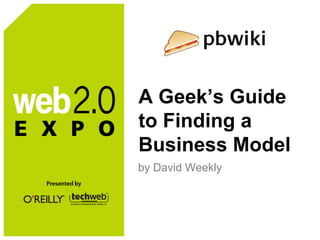David Weekly's PBwiki Web 2.0 Expo Talk
- 1. A Geek’s Guide to Finding a Business Model by David Weekly
- 2. Business is Learnable If you’re smart enough to program, you’re smart enough to start a business. (the opposite may not be true)
- 3. Why Business? It’s another lens through which to understand the world. Systems of the world: Biology Astronomy Chemistry Physics Politics Psychology Economics Storytelling
- 4. Why Business? It is not a good way to get rich quickly. But it is a good way to be in control of your destiny.
- 5. Why’d I Start a Business? My History: Started Coding @ 5 Online @ 10 Professional Work @ 15 Pro Engineer @ 25 … what now?
- 6. Why’d I Start a Business? Options: PhD in CS Tedious, 4 years, marginal gains. MBA Exciting, fun, 2 years, some skills & network. Start a Company Exciting, immediate, lots of new skills .
- 7. Why’d I Start a Business? The Shocker…? Zero opportunity cost.
- 8. Zero Opportunity Cost? Even a Failed Startup Teaches You: How to hire, manage, and fire people. How to structure a plan, test hypothesis, grok a market. How to write a business plan. How to structure finances. It’s better than business school. And it qualifies you for management.
- 9. So…Opportunity Cost? $80,000 engineer salary versus Two years of $0/year then $130,000 manager salary
- 10. Be Bold Trying Is Good. So be bold .
- 11. Business Preparation I got ready to fail. (good thing, too…)
- 12. Selected Failures BotBlock.com L0K8.com
- 13. Results? Fancy Technology Didn’t Win. Simple Projects That Addressed Needs Did. Premature Optimization is the Root of All Evil. The Media Loves Failure.
- 14. The Answer I had been helping groups with wikis for years. But they weren’t fancy technologies. So I didn’t think there was a business. But I got tired of helping friends set up wikis. They should be able to do it themselves! … as easily as making a peanut butter sandwich…
- 15. Humility In two weeks, my weekend project had more attention than my year-and-a-half old project.
- 16. 1 st Business Model: Ads Wikis are mostly text… so should be good for AdWords? … but... Very wide diversity of communities = low CPM. 100,000 users/mo 10 pages each $1 CPM… $1,000/month
- 17. 2 nd Model: Vertical Communities We built vertical wiki communities: Red Sox, Chronicles of Narnia, The O.C., Home Improvement… Advertise in niches = High CPM! … but… building communities is hard. Especially when you’re not a member, and especially when you try to grow a lot of them quickly.
- 18. 3 rd : Consumer Subscriptions $5/mo/wiki = no ads People paid! … but… Consumer subscriptions usually have 1-5% conversion. So we’d need to be signing up 350k – 1.5m new groups a year to be a million dollar business. Gack.
- 19. 4 th Model: Education “ Great work in Chicago!” ??? Very helpful & energetic demographic. But it’s hard to build an empire from 5 th grade teachers’ pocketbooks.
- 20. 5 th Model: Enterprise SaaS Our native model (subscriptions) … applied to people who could actually pay (businesses) … and who find us valuable (productivity) A proven business model:
- 21. The Catch? I’m not good at Enterprise Sales & Marketing.
- 22. Humility The Branson / Buffett Model : Hire someone to make you rich. … so I did: Jim Groff Sold 1 st Company to Apple for $XXm Sold 2 nd company to Oracle for $XXXm … and now PBwiki.
- 23. “ Know Thyself” Know your strengths, Route around your weaknesses, Know that you will fail in the short term And that this is the path to long-term success.
- 24. Where We’re At Millions of users/month 800,000+ communities 50,000+ businesses Teams at half the F500 More content than Wikipedia 30 employees … and rapid adoption by lawyers and for projects . (the experiment continues)
- 25. Lessons Learned Wrong-Thinking: Networking is for losers. If you’re smart, people will find you. If you write clever software, you’ll become rich and famous. Delegation means you couldn’t figure it out. Right-Thinking: Use the scientific method: Hypothesize, Experiment, Measure, Evaluate, Repeat. Expect to be wrong. Stick to hiring A -people. ( A s hire A s, B s hire C s, and A s get 100x more work done than C s)
- 26. David E. Weekly [email_address]

